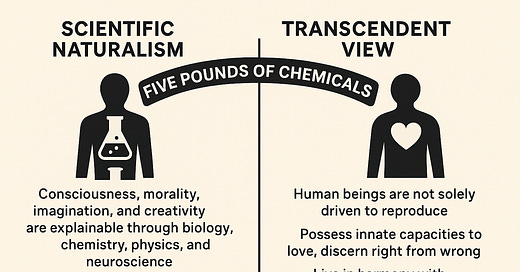Are We More Than Five Pounds of Chemicals Here to Reproduce Our DNA?
What does it mean to be human?
Are we just machines made up of five pounds of chemicals propagating DNA? What does it mean to be human? Since at least the late 17th century, there’s been an on-going debate in the West about what it means to be human.
English philosopher John Locke (1632-1704) argued the human mind is a “blank slate,” that all knowledge, morality, and creativity arise exclusively from experience and sense perception. There is no built-in knowledge, moral code or universal truth. This idea is alive and well in the 21st century, expressed through a sharply divided debate between two opposing camps.
Scientific naturalism, a modern term used in academic and popular discussion, claims human consciousness, morality, imagination, and creativity can all be explained through biology, chemistry, physics, and neuroscience. No supernatural forces or entities exist. Only through the scientific method we can gain any knowledge about reality or the human condition.
The opposing view, sometimes referred to as the transcendent view, claims human beings are not just five pounds of chemicals driven to reproduce their species. We are alive here on earth with innate capacities to love, know right from wrong, and live in harmony with a deeper, mysterious reality, beyond the five senses.
Does one have to choose between these two seeming opposing views to live a good life or feel happy? Perhaps the ever-direct Chinese-American Taoist and martial artist, Bruce Lee, offers a life line out of these two extremes:
“When hungry, eat. When tired, sleep. When it’s time, die.”—The Tao of Jeet Kune Do





Scientific naturalism - interesting and hard to argue with. Like most things, we need a blend of both views to create a total picture.
Interesting topic. You left me hungry for more, but left me disappointed in the end-short and without exploration. I hope you will write a part 2 🙏